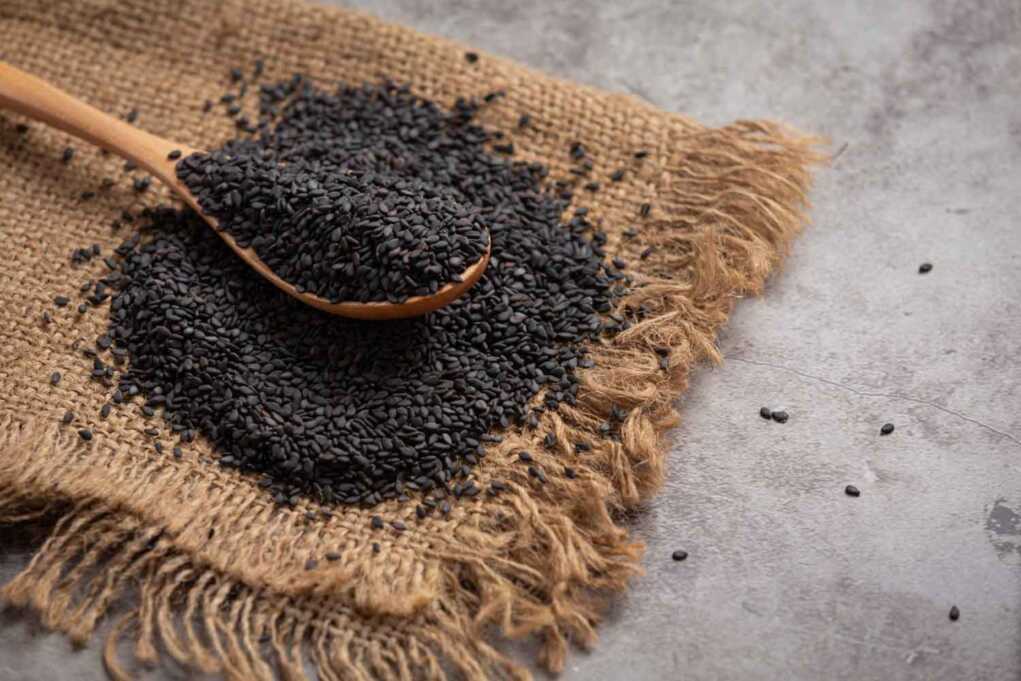
Since ancient times, black sesame seeds have been used for kidney support, hair vitality, and prevention of osteoporosis.
Black sesame seeds are an ancient and healthful food, celebrated as the king of seeds and even revered as the “food of the immortals.” Black sesame seeds offer numerous health benefits, such as nourishing the kidneys, promoting bone health, darkening hair, preventing premature aging, and even boosting memory and hearing. However, they may not be suitable for everyone.
In addition to various health benefits the tiny black sesame seeds also have a rich and aromatic flavor. In this article, we will guide you on how to create simple and nutritious black sesame dishes at home using natural ingredients.
Benefits of Black Sesame Seeds
The health benefits of black sesame seeds have been discovered and utilized since ancient times. In traditional Chinese medicine (TCM), black sesame is often used to address various conditions, including premature graying and hair loss, weakness and soreness in the lower back and knees, fatigue in the limbs, internal organ deficiencies, dry skin and hair, and constipation.
-
Nourishes Kidneys, Strengthens Bones, Enhances Memory
Black sesame seeds are rich in minerals such as calcium, magnesium, and zinc, playing a crucial role in increasing bone density and preventing osteoporosis. Incorporating black sesame seeds into the diet is particularly beneficial for the growth and development of children and the bone health of the elderly.
The phospholipids in black sesame may contribute to nourishing the nervous system, enhancing memory, improving mental focus, and addressing issues such as memory decline.
In TCM, black sesame seeds are considered to have a neutral and sweet taste, which can promote spleen and stomach health. TCM also associates the color black with the kidneys. Therefore, black sesame is believed to benefit kidney health, helping to prevent and alleviate various issues caused by insufficient kidney qi, including osteoporosis, hearing loss, tinnitus, mental fog, and memory decline.
According to TCM, meridians are the channels through which energy flows in the human body. They are responsible for transporting qi and blood—the fundamental substances that constitute and sustain human life—throughout the body. In TCM, all nutrients that supplement the body are collectively referred to as blood. When there is an imbalance or deficiency of qi and blood in the body, diseases or other conditions may occur.
-
Darkens Hair, Delays Aging, Promotes Bowel Movement
The vitamin E in black sesame seeds offers antioxidant properties, delaying the aging process. It also helps maintain skin elasticity.
In TCM, there is a belief that “hair is the surplus of blood,” suggesting that when the blood is abundant, there is extra energy available to nourish the hair. Black sesame seeds, being rich in iron, help replenish blood, thus promoting hair growth, maintaining its color and shine, and potentially preventing the occurrence of white hair.
Additionally, black sesame seeds have a high oil content, which promotes gastrointestinal peristalsis and aids in digestion. The abundant fiber in black sesame seeds also contributes to smooth bowel movements.
-
Treats Acne and Wounds
Black sesame seeds are not only beneficial when eaten but also serve as an external remedy for certain skin conditions. In ancient times, they were often used to treat acne, scabies, rashes, and other skin ailments.
The method involves chewing raw sesame seeds and applying the chewed mixture to the affected area. Saliva, with its natural antimicrobial properties, helps reduce inflammation and relieve itching. For burns, one can grind sesame seeds into a paste using tools like a mortar and pestle or a grinder, then apply the resulting paste to the affected area for similar therapeutic effects.
Kidney ‘Replenishment’and Health Preservation Recipes for Winter
The classic Chinese medical text, “The Yellow Emperor’s Classic of Internal Medicine,” advocates seasonal health preservation, suggesting nourishing the liver in spring, protecting the heart in summer, nurturing the lungs in autumn, and replenishing the kidneys in winter. As we enter the winter season, it is an opportune time for kidney replenishment. Below are some excellent ways to replenish the kidneys and promote overall well-being using black sesame seeds:
Fu Sang Wan (Black Sesame Seeds + Mulberry Leaf)
Sesame seeds have been used by people to create health supplements since ancient times. One wellness recipe involved grinding black sesame seeds and mulberry leaves into a fine powder, then mixing it with honey to form pills known as Fu Sang Wan.
Fu Sang Wan is said to alleviate rheumatism, enhance beauty, darken hair, and promote overall health and wellness. Today, we can either make the pills ourselves or have them prepared by a traditional Chinese medicine practitioner. Eating black sesame seeds directly can also yield similar effects.
Black Sesame Chestnut Soy Milk
Ingredients:
16.9 fluid ounces (500 milliliters) soy milk
0.35 ounces (10 grams) cooked chestnuts
0.18 ounces (5 grams) black sesame powder (ground at home or purchased ground)
To prepare:
Remove chestnut shells and cut the nuts into small pieces.
Place chestnuts, soy milk, and black sesame powder into a pot, and bring to a boil for 5 mins, blend until smooth and and it’s ready to drink.
Chestnuts can nourish the kidneys, invigorate the stomach, and strengthen muscles and bones. Paired with black sesame seeds and soy milk, they not only replenish kidney qi but also provide a protein boost. Sufficient kidney qi can promote mental clarity, improve hearing, and alleviate tinnitus.
Black Sesame Milk
A simpler method is to add a spoonful of black sesame powder to your fresh milk or soy milk and drink it in the morning. Simply mix it well, and it is ready to drink. This beverage can boost energy, improve work efficiency, and even alleviate constipation.
Precautions for Consuming Black Sesame Seeds
While black sesame seeds offer numerous health benefits, it’s important to eat them in moderation due to their high oil content. A recommended daily intake is around 0.35 ounces (10 grams).
Black sesame seeds may not be suitable for everyone, particularly for people with the following conditions:
-
Skin Inflammation
Black sesame seeds are considered stimulating food, and their consumption may exacerbate existing inflammatory symptoms. Individuals with skin conditions such as acne, scabies, rashes, or inflamed wounds should limit their intake of black sesame seeds, as it may worsen inflammation.
-
Sesame Allergy
Despite being listed as one of the top nine major food allergens in the United States, sesame is widely used in the food processing industry.
If symptoms such as rash, facial or lip swelling, vomiting, diarrhea, abdominal pain, dizziness, or difficulty breathing arise after eating black sesame, consumption should be immediately stopped. It is essential to assess whether medical assistance is required. Additionally, seeking a diagnosis from a medical professional is advised to confirm if the mentioned adverse reactions are caused by a food allergen.
Note: Some herbs mentioned in this article may be unfamiliar, but they are generally available in health food stores and Asian grocery stores. It is important to note that treatment methods may vary depending on the individual. Please consult with a health care professional for a specific treatment plan.
Important Notice: This article was originally published at www.theepochtimes.com by Naiwen Hu where all credits are due.
Disclaimer
The watching, interacting, and participation of any kind with anything on this page does not constitute or initiate a doctor-patient relationship with Dr. Farrah™. None of the statements here have been evaluated by the Food and Drug Administration (FDA). The products of Dr. Farrah™ are not intended to diagnose, treat, cure, or prevent any disease. The information being provided should only be considered for education and entertainment purposes only. If you feel that anything you see or hear may be of value to you on this page or on any other medium of any kind associated with, showing, or quoting anything relating to Dr. Farrah™ in any way at any time, you are encouraged to and agree to consult with a licensed healthcare professional in your area to discuss it. If you feel that you’re having a healthcare emergency, seek medical attention immediately. The views expressed here are simply either the views and opinions of Dr. Farrah™ or others appearing and are protected under the first amendment.
Dr. Farrah™ is a highly experienced Licensed Medical Doctor certified in evidence-based clinical nutrition, not some enthusiast, formulator, or medium promoting the wild and unrestrained use of nutrition products for health issues without clinical experience and scientific evidence of therapeutic benefit. Dr. Farrah™ has personally and keenly studied everything she recommends, and more importantly, she’s closely observed the reactions and results in a clinical setting countless times over the course of her career involving the treatment of over 150,000 patients.
Dr. Farrah™ promotes evidence-based natural approaches to health, which means integrating her individual scientific and clinical expertise with the best available external clinical evidence from systematic research. By individual clinical expertise, I refer to the proficiency and judgment that individual clinicians acquire through clinical experience and clinical practice.
Dr. Farrah™ does not make any representation or warranties with respect to the accuracy, applicability, fitness, or completeness of any multimedia content provided. Dr. Farrah™ does not warrant the performance, effectiveness, or applicability of any sites listed, linked, or referenced to, in, or by any multimedia content.
To be clear, the multimedia content is not intended to be a substitute for professional medical advice, diagnosis, or treatment. Always seek the advice of your physician or other qualified health providers with any questions you may have regarding a medical condition. Never disregard professional medical advice or delay in seeking it because of something you have read or seen in any website, video, image, or media of any kind. Dr. Farrah™ hereby disclaims any and all liability to any party for any direct, indirect, implied, punitive, special, incidental, or other consequential damages arising directly or indirectly from any use of the content, which is provided as is, and without warranties.








